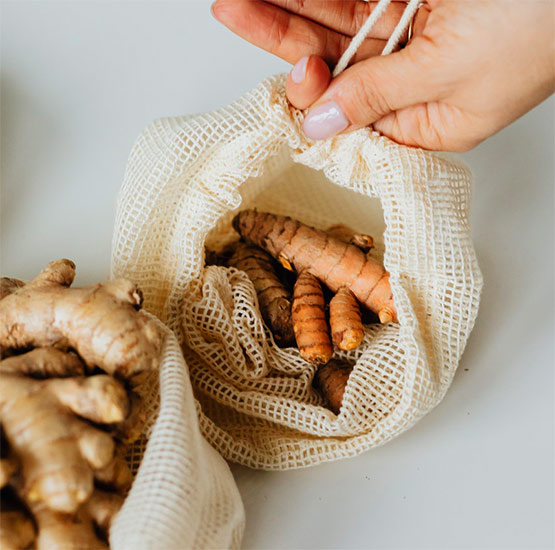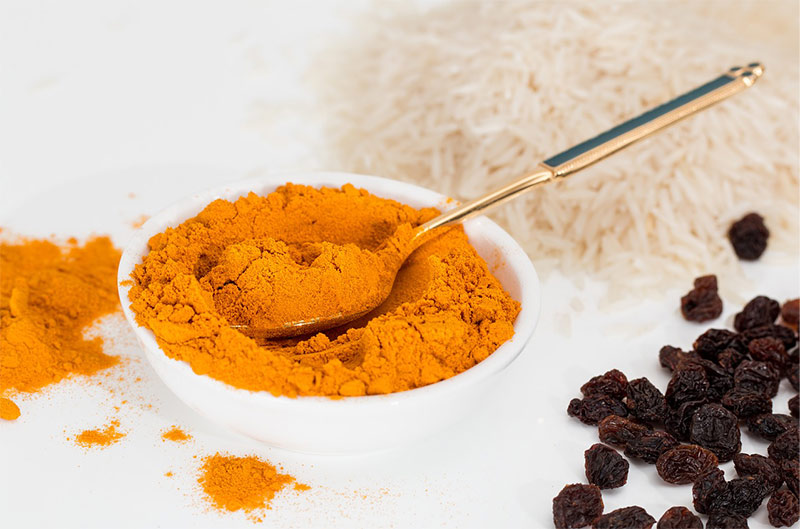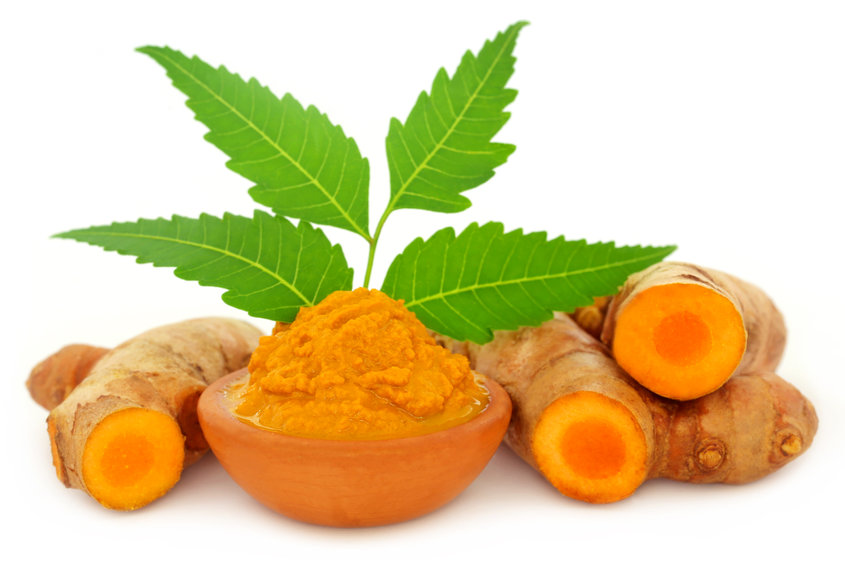This tasty, sunrise-colored spice has long been used to treat pain and inflammation.
by Lisa Esposito and Elaine K. Howley
Orig. August 9, 2021
If you’re looking to eat your way to better health, don’t forget the spice cabinet. In particular, one vibrant yellow-orange spice called turmeric is drawing new attention for its apparent ability to supply a range of health benefits.
“Turmeric is a popular spice, sometimes known as the ‘golden spice,’ that’s derived from the root of the turmeric plant,” says Reema Kanda, a registered dietitian nutritionist with the Hoag Orthopedic Institute in Irvine, California. Part of the ginger family, turmeric hails from India and Southeast Asia and shows up frequently in cuisine from that region.
In addition to enhancing flavor and color, turmeric has long been revered for its therapeutic benefits. As such, it’s a key ingredient of certain Ayurvedic and Chinese medicines. These two eastern health practices “have used turmeric for treatment of pain and inflammatory disorders” for centuries, Kanda explains.
Health Benefits
More recently, Western medicine has started to study this spice to better understand its benefits, Kanda notes. Here’s what’s known and what’s still being learned about turmeric’s possible healthy properties.
Inflammation Reduction
Turmeric may reduce systemic inflammation and increase the body’s ability to resist the effect of free radicals, which are chemical compounds that essentially age cells and can contribute to the development of chronic diseases.
Arthritis
Turmeric is sometimes used to relieve joint pain associated with arthritis. The Natural Medicines Comprehensive Database, a searchable tool for consumers, rates turmeric as “possibly effective” for this use.
In its listing of supplements and herbs used for arthritis symptoms, the Arthritis Foundation notes that a 2016, industry-sponsored systematic review found that 1,000 mg a day of curcumin – a major turmeric component – reduced osteoarthritis pain and inflammation as well as nonsteroidal anti-inflammatory drugs.
Turmeric also appears to have a benefit on knee osteoarthritis pain and function similar to that of NSAIDs, according to a systematic review published January 2021 in the journal BMJ Open Sport & Exercise Medicine.
Cognition
Turmeric can increase levels of brain-derived neurotrophic factor, or BDNF, a brain hormone that may help keep your brain more nimble and better able to fend off age-related cognitive decline and dementia.
However, the Natural Medicines Comprehensive Database rates turmeric as “possibly ineffective” for Alzheimer’s disease, with “insufficient evidence to rate effectiveness for decline in memory and thinking skills that occur with age.”
Some research, including a May 2019 systematic review in the journal Nutrition Research, supports the use of curcumin supplementation for increasing BDNF levels in the body.
“Even if it turns out turmeric can boost BDNF, it’s not the only thing,” notes Carrie Dennett, a registered dietitian nutritionist at Nutrition By Carrie, and author of “Healthy For Your Life: A Holistic Approach to Optimal Wellness.” “Generally, living an active, healthy lifestyle also helps us with BDNF levels.”
Blood Vessels
Turmeric improves the ability of the lining of the blood vessels to repair themselves, which could reduce blood pressure, risk of blood clots and strokes and the risk of heart disease.
For example, a small study in the January 2017 issue of the journal Aging found that short-term curcumin supplementation improved artery function and stiffness in healthy middle-aged and older adults.
Cancer
Turmeric is being studied for its potential to slow or halt the growth of cancer cells. “Turmeric is anti-inflammatory and antioxidant, which means it’s anti-cancer,” says Daryl Gioffre, a celebrity nutritionist and author of “Get Off Your Acid: 7 Steps in 7 Days to Lose Weight, Fight Inflammation, and Reclaim Your Health and Energy.”
Many types of cancer thrive on inflammation throughout the whole body, and some evidence suggests turmeric might one day be used as not just a prevention, but also a treatment for cancer. Curcumin may help counter cell-signaling action involved in cancer development and spread within the body, according to a study in the May 2019 issue of the journal Nutrients.

Digestive System Effects
Turmeric may work directly on the digestive system to reduce inflammation. “Turmeric has prebiotic-like properties, which enable it to positively influence gut microbiota, supporting the gut-immune connection,” says Acacia Wright, a registered dietitian at Orgain, a clean protein brand based in Irvine, California.
Prebiotics are a kind of indigestible fiber that feed probiotics – the healthy microorganisms that live in the gut and contribute to a range of bodily functions and overall wellness. Improving the gut microbiome may make you less susceptible to a variety of infections and diseases.
How Turmeric Works
Turmeric provides a solid dose of phytochemicals – plant compounds that help fight inflammation and oxidative stress, or the daily wear-and-tear our bodies endure every day. In addition, this spice contains plenty of vitamin C, which can aid the immune system, and is a good source of manganese, iron and potassium.
But when it comes to health benefits, turmeric’s biggest selling point is its hallmark compound: curcumin.
Research has indicated that curcumin may play a protective role in fighting inflammatory disease by helping reduce the body’s inflammatory response to everything from food and drink to stress and pollution.
Ability to reduce chronic inflammation is important, because it promotes many disease states, Kanda says. Diabetes, cardiovascular disease, inflammatory bowel diseases such as Crohn’s disease and ulcerative colitis, certain types of cancer including colon cancer, arthritis and autoimmune disorders have all been linked to inflammation.
“Evidence supports that phytochemicals from natural foods such as spices and herbs are safe and effective therapies to potentially help reduce inflammation and can possibly be beneficial in prevention of inflammatory diseases,” Kanda says, though she adds that “further large-scale scientific evidence is still warranted to identify turmeric’s long-term effectiveness.”
When pro-turmeric data is mentioned, it’s worth asking whether it’s based on human, animal or laboratory studies. It’s also helpful to look at study quality: Is it a double-blinded, randomized controlled trial or a small study with few participants? Many food or supplement studies are industry funded, which is also something to take into account.
Supplement Considerations
Overall, it seems that turmeric is a great spice to add to your cooking – and possibly even as a supplement – though many nutritionists, dietitians and doctors agree that it’s generally better to get all your nutritional needs met via whole foods rather than relying on supplements.
Kanda notes that research into the health benefits and potential risks of turmeric is still evolving. More work needs to be done until it’s known for certain how turmeric works, what the right dose is to prevent or treat certain conditions and whether there are any long-term drawbacks to using turmeric for health reasons.
One difficulty with turmeric is establishing how much of the curcumin is actually bioavailable, or able to be used by the body. “Most of the compound is excreted in feces and only traces appear in the blood,” Kanda notes. “What this means is more research is needed for identifying methods in improving the bioavailability by various delivery systems into the body.”
If you’re interested in taking a supplement, go for turmeric as a whole rather than its isolated ingredient curcumin, Dennett suggests. Although researchers initially focused on the health properties that curcumin has, she says, “now they’re finding that actually so do other components of turmeric.”
“That’s where research is starting to point: We should just go for turmeric in our cooking if we can, if that’s appealing to us,” Dennett says. “But otherwise, getting the whole turmeric powder in supplements.”
No need to overdo it, either. “If somebody is taking capsules, it wouldn’t be a good idea to (conclude): Oh, if a little is good, more is better,” Dennett says. “I would stick to the recommended dosages on the label.”
One thing that is known is that piperine, black pepper’s signature compound, can boost absorption of turmeric by 2000% according to some research. If you’re opting for a curcumin supplement, choose one that also contains piperine, which is often sold under the name BioPerine.
Kanda notes that if you’re supplementing with turmeric, be aware that some people who have consumed high levels of turmeric extracts have reported some mild side effects including stomach upset, dizziness or diarrhea. If you have anemia or low levels of iron, you should probably not be taking high doses of turmeric as it may inhibit the absorption of iron from your diet.
And if you’re going to have surgery, consider skipping the turmeric supplement for a while beforehand, as high doses of turmeric supplements have been associated with slower blood clotting. This could cause more bleeding during and after surgery.
As with any supplement, be sure to speak with your doctor before you start taking anything to make sure there are no adverse interactions with other medications or supplements you may be taking and to make sure that supplementation makes sense for you.
Cooking With Turmeric
While science is still working out the particulars of supplementation, Kanda says “we can all reap the benefits of turmeric by using whole or ground dried turmeric in cooking.” Try adding it to poultry, seafood and lentil-based dishes to enhance color and as a flavor accent. “You can sprinkle it in any dish along with your other favorite seasonings, such as thyme, cumin or garlic. And if you enjoy mixing marinades, try adding turmeric.”
You can also add it to healthy drinks such as smoothies or teas. “Golden milk” is a tasty mixture of milk and turmeric that also provides protein and calcium.
Article by:
Lisa Esposito and Elaine K. Howley, Reviewed by Joan Salge Blake, EdD, MS, RDN, FAND, Aug. 9, 2021,
What Are the Health Benefits of Turmeric?, https://health.usnews.com/wellness/food/articles/what-are-the-health-benefits-of-turmeric#:~:text=Turmeric%20provides%20a%20solid%20dose,of%20manganese%2C%20iron%20and%20potassium
Resources:
The U.S. News Health team delivers accurate information about health, nutrition and fitness, as well as in-depth medical condition guides. All of our stories rely on multiple, independent sources and experts in the field, such as medical doctors and licensed nutritionists. To learn more about how we keep our content accurate and trustworthy, read our editorial guidelines.
Carrie Dennett, MPH, RDN, CD
Dennett is a Pacific Northwest-based registered dietitian and owner of Nutrition by Carrie.
Daryl Gioffre, DC
Gioffre is a chiropractor, celebrity nutritionist and author of “Get Off Your Acid: 7 Steps in 7 Days to Lose Weight, Fight Inflammation and Reclaim Your Health and Energy.”
Reema Kanda, RDN, What are the health benefits of Turmeric?, July 2020, https://www.hoagorthopedicinstitute.com/press-center/hoi-in-the-media/2020/what-are-the-health-benefits-of-turmeric-hear-fr/. Kanda is a registered dietitian nutritionist with the Hoag Orthopedic Institute in Irvine, California.
Acacia Wright, RD, What are the benefits of Turmeric,
Wright is a registered dietitian at Orgain, a clean protein brand based in Irvine, California, August 9, 2021, https://health.usnews.com/wellness/food/articles/what-are-the-health-benefits-of-turmeric#:~:text=Turmeric%20provides%20a%20solid%20dose,of%20manganese%2C%20iron%20and%20potassium.









